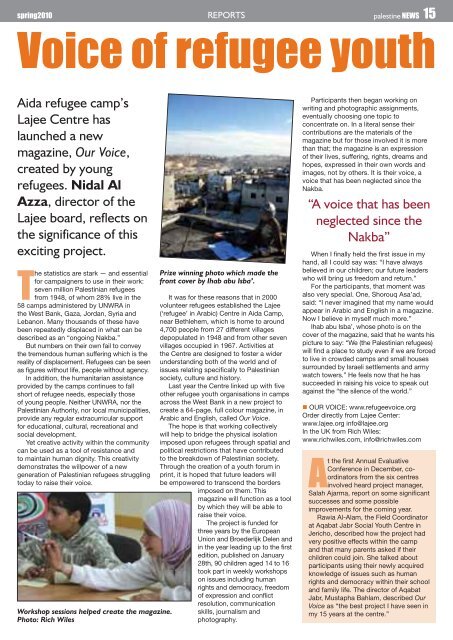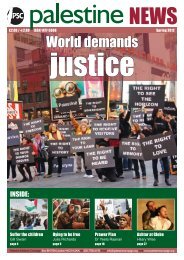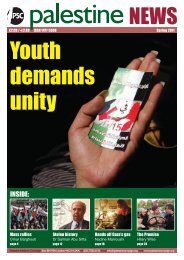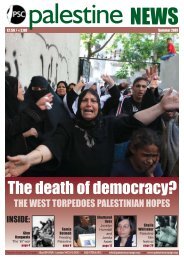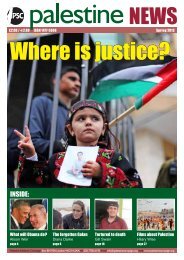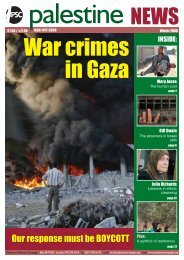INSIDE: - Palestine Solidarity Campaign
INSIDE: - Palestine Solidarity Campaign
INSIDE: - Palestine Solidarity Campaign
Create successful ePaper yourself
Turn your PDF publications into a flip-book with our unique Google optimized e-Paper software.
spring2010 REPORTS<br />
palestine NEWS 15<br />
Voice of refugee youth<br />
Aida refugee camp’s<br />
Lajee Centre has<br />
launched a new<br />
magazine, Our Voice,<br />
created by young<br />
refugees. Nidal Al<br />
Azza, director of the<br />
Lajee board, reflects on<br />
the significance of this<br />
exciting project.<br />
The statistics are stark — and essential<br />
for campaigners to use in their work:<br />
seven million Palestinian refugees<br />
from 1948, of whom 28% live in the<br />
58 camps administered by UNWRA in<br />
the West Bank, Gaza, Jordan, Syria and<br />
Lebanon. Many thousands of these have<br />
been repeatedly displaced in what can be<br />
described as an “ongoing Nakba.”<br />
But numbers on their own fail to convey<br />
the tremendous human suffering which is the<br />
reality of displacement. Refugees can be seen<br />
as figures without life, people without agency.<br />
In addition, the humanitarian assistance<br />
provided by the camps continues to fall<br />
short of refugee needs, especially those<br />
of young people. Neither UNWRA, nor the<br />
Palestinian Authority, nor local municipalities,<br />
provide any regular extracurricular support<br />
for educational, cultural, recreational and<br />
social development.<br />
Yet creative activity within the community<br />
can be used as a tool of resistance and<br />
to maintain human dignity. This creativity<br />
demonstrates the willpower of a new<br />
generation of Palestinian refugees struggling<br />
today to raise their voice.<br />
Workshop sessions helped create the magazine.<br />
Photo: Rich Wiles<br />
Prize winning photo which made the<br />
front cover by Ihab abu Isba’.<br />
It was for these reasons that in 2000<br />
volunteer refugees established the Lajee<br />
(‘refugee’ in Arabic) Centre in Aida Camp,<br />
near Bethlehem, which is home to around<br />
4,700 people from 27 different villages<br />
depopulated in 1948 and from other seven<br />
villages occupied in 1967. Activities at<br />
the Centre are designed to foster a wider<br />
understanding both of the world and of<br />
issues relating specifically to Palestinian<br />
society, culture and history.<br />
Last year the Centre linked up with five<br />
other refugee youth organisations in camps<br />
across the West Bank in a new project to<br />
create a 64-page, full colour magazine, in<br />
Arabic and English, called Our Voice.<br />
The hope is that working collectively<br />
will help to bridge the physical isolation<br />
imposed upon refugees through spatial and<br />
political restrictions that have contributed<br />
to the breakdown of Palestinian society.<br />
Through the creation of a youth forum in<br />
print, it is hoped that future leaders will<br />
be empowered to transcend the borders<br />
imposed on them. This<br />
magazine will function as a tool<br />
by which they will be able to<br />
raise their voice.<br />
The project is funded for<br />
three years by the European<br />
Union and Broederlijk Delen and<br />
in the year leading up to the first<br />
edition, published on January<br />
28th, 90 children aged 14 to 16<br />
took part in weekly workshops<br />
on issues including human<br />
rights and democracy, freedom<br />
of expression and conflict<br />
resolution, communication<br />
skills, journalism and<br />
photography.<br />
Participants then began working on<br />
writing and photographic assignments,<br />
eventually choosing one topic to<br />
concentrate on. In a literal sense their<br />
contributions are the materials of the<br />
magazine but for those involved it is more<br />
than that; the magazine is an expression<br />
of their lives, suffering, rights, dreams and<br />
hopes, expressed in their own words and<br />
images, not by others. It is their voice, a<br />
voice that has been neglected since the<br />
Nakba.<br />
“A voice that has been<br />
neglected since the<br />
Nakba”<br />
When I finally held the first issue in my<br />
hand, all I could say was: “I have always<br />
believed in our children; our future leaders<br />
who will bring us freedom and return.”<br />
For the participants, that moment was<br />
also very special. One, Shorouq Asa’ad,<br />
said: “I never imagined that my name would<br />
appear in Arabic and English in a magazine.<br />
Now I believe in myself much more.”<br />
Ihab abu Isba’, whose photo is on the<br />
cover of the magazine, said that he wants his<br />
picture to say: “We (the Palestinian refugees)<br />
will find a place to study even if we are forced<br />
to live in crowded camps and small houses<br />
surrounded by Israeli settlements and army<br />
watch towers.” He feels now that he has<br />
succeeded in raising his voice to speak out<br />
against the “the silence of the world.”<br />
• OUR VOICE: www.refugeevoice.org<br />
Order directly from Lajee Center:<br />
www.lajee.org info@lajee.org<br />
In the UK from Rich Wiles:<br />
www.richwiles.com, info@richwiles.com<br />
At the first Annual Evaluative<br />
Conference in December, coordinators<br />
from the six centres<br />
involved heard project manager,<br />
Salah Ajarma, report on some significant<br />
successes and some possible<br />
improvements for the coming year.<br />
Rawia Al-Alam, the Field Coordinator<br />
at Aqabat Jabr Social Youth Centre in<br />
Jericho, described how the project had<br />
very positive effects within the camp<br />
and that many parents asked if their<br />
children could join. She talked about<br />
participants using their newly acquired<br />
knowledge of issues such as human<br />
rights and democracy within their school<br />
and family life. The director of Aqabat<br />
Jabr, Mustapha Bahlam, described Our<br />
Voice as “the best project I have seen in<br />
my 15 years at the centre.”


